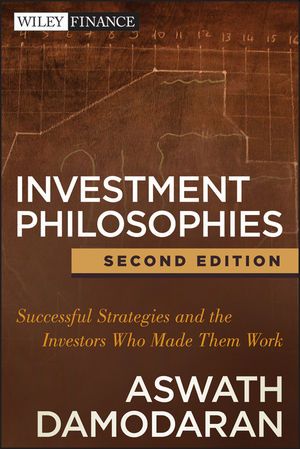In his book – Investment Philosophies: Successful Strategies and the Investors Who Made Them Work, Aswath Damodaran discusses how to develop the right investing philosophy for you. Here’s an excerpt from the book:
Once you understand the basics of investing, form your views on human foibles and behavior, and review the evidence accumulated on each of the different investment philosophies, you are ready to make your choice. In our view, there is potential for success with almost every investment philosophy (yes, even charting), but the prerequisites for success can vary. In particular, success may rest on:
Your risk aversion. Some strategies are inherently riskier than others. For instance, venture capital or private equity investing, where you invest your funds in small, private businesses that show promise, is inherently more risky than buying value stocks or equity in large, stable, publicly traded companies. The returns are also likely to be higher.
However, more risk-averse investors should avoid the first strategy and focus on the second. Picking an investment philosophy (and strategy) that requires you to take on more risk than you feel comfortable taking
on can be hazardous to your health and your portfolio.
The size of your portfolio. Some strategies require larger portfolios for success, whereas others work only on a smaller scale. For instance, it is very difficult to be an activist value investor if you have only $100,000 in your portfolio, since firms are unlikely to listen to your complaints. At the other extreme, a portfolio manager with $100 billion to invest may not be able to adopt a strategy that requires buying small, neglected companies. With such a large portfolio, the portfolio manager would very quickly end up becoming the dominant stockholder in each of the companies and affecting the price every time he or she trades.
Your time horizon. Some investment philosophies are predicated on a long time horizon, whereas others require much shorter time horizons. If you are investing your own funds, your time horizon is determined by your personal characteristics (some of us are more patient than others) and your needs for cash (the greater the need for liquidity, the shorter your time horizon has to be). If you are a professional (an investment adviser or portfolio manager) managing the funds of others, it is your clients’ time horizons and cash needs that will drive your choice of investment philosophies and strategies. You are only as long term as your clients allow you to be.
Your tax status. Since such a significant portion of your money ends up going to the tax collectors, taxes have a strong influence on your investment strategies and perhaps even the investment philosophy you adopt. In some cases, you may have to abandon strategies that you find attractive on a pretax basis because of the tax bite that they expose you to.
Thus, the right investment philosophy for you will reflect your particular strengths and weaknesses. It should come as no surprise, then, that investment philosophies that work for some investors do not work for others. Consequently, there can be no one investment philosophy that can be labeled “best” for all investors.
For all the latest news and podcasts, join our free newsletter here.
Don’t forget to check out our FREE Large Cap 1000 – Stock Screener, here at The Acquirer’s Multiple:



